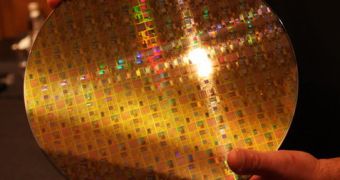Famous Taiwanese semiconductor foundry TSMC has reportedly posted very high profits for last month. In April, TSMC’s revenue reached a very high 1.38 billion dollars.
That represents a 9.2 percent growth when compared with April last year. The difference is likely coming from the fact that in 2011, 40 nm manufacturing technology was maturing and the manufacturing contracts were renegotiated with lower costs.
At that time, more foundries were manufacturing in 40 nm or 32 nm, and thus, TSMC’s clients were able to negociate better prices.
This year, TSMC is, at the moment, the only foundry manufacturing 28 nm products in high volumes. Well, those are high volumes considering that they do contribute significantly to the company’s revenues. Overall, TSMC’s shipments have only reached 5% of the company’s total manufacturing capacity.
In the semiconductor industry, and IT industry in general, most of the revenues come from low to mid price products and most of the profits come from the high end / high margins products.
The 28 nm manufacturing process is the high end product at TSMC and, currently, it is in very high demand from AMD, Nvidia and Qualcomm. When you sell out your most expensive product line, your profit will surely soar significantly.
Currently, TSMC is enjoying exclusivity in the market, as they are the only foundry manufacturing 28 nm products in volume for revenues.
Although they are testing and certifying their production line, Samsung is now concentrating on their 32 nm manufacturing process, UMC is still testing producing 28 nm chips and GlobalFoundries’ main line is still the 32 nm SOI technology, although they are also promising volume production of 28 nm chip this summer.
TSMC could have done much better if their production line were able to manufacture more chips. The company is promising they’ll double their 28 nm manufacturing capacities this year, but currently they’re still unable to satisfy their customers’ orders.

 14 DAY TRIAL //
14 DAY TRIAL //